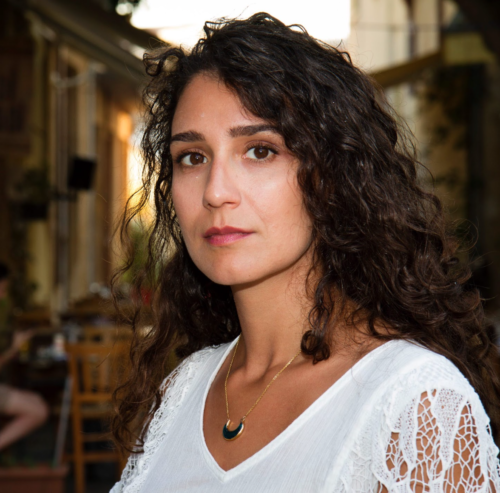The water cuts out while shampoo still clogs my hair.The nurse who swabs my nose hopes I don’t have the virus, it’s a bitch.The building across from the cemetery calls itself LIFE STORAGE.My little brother was shot, I tell the barista who asks how things have been,and tip extra for her inconvenience. We speak onlyto the dead, someone tells me— to comfort, I assume, or inspire,but I take it literally as I am wont: even my shut up and fuck and let’s cook tonight,those are for you, Stephen. You won’t come to me in my dreams,so I must communicate by other avenues.A friend sends an image from Cy Twombly’s Fifty Days at Iliam— a red bloom, on the words “like a fire that consumes all before it”—and asks: Have you seen this? It’s at the Philadelphia Museum of Art.If I have, I can’t remember, though I did visitwith you, when you were eleven or twelve, when you trippedsilent alarm after silent alarm, skating out of each roomas guards jostled in, and I— though charged with keeping youfrom trouble— joined the game, and the whole time we never laughed,not til we were released into the grand air we couldn’t touch and could.You are dead at twenty-two. As I rinse dishes, fumble for keys, buy kale and radishes,in my ear Priam repeats, I have kissed the hand of the man who killed my son.Would I do that? I ask as I pass the store labeled SIGNS SIGNS.I’ve studied the mugshot of the man who killed you; I can imagine his hands.Of course I would. Each finger, even.To hold your body again. And to resurrect you? Who knows what I am capable of.If I were. Nights, I replay news footage: your blood on asphalt, sheen behind caution tape.Homer’s similes, I’ve been told, are holes cut in the cloth between the world of warand another, more peaceful world. On rereading, I find even there, a man kills his neighbor.“Let Achilles cut me down, / as soon as I have taken my son into my armsand have satisfied my desire for grief” —this, my mind’s new refrainin the pharmacy queue, in the train’s rattling frame.The same friend and I discuss a line by Zbigniew Herbert“where a distant fire is burning / like a page of the Iliad.”It’s nearly an ontological question, my friend says, the instability of reference:The fires in the pages of the poem, the literal page set afire.We see double.You are the boy in the museum. You are the body consumed, ash.Alone in a London museum, I saw a watercolor of twin flames, one black, one a gauzy red,only to learn the title is Boats at Sea. It’s like how sometimes I forget your’e gone.But it’s not like that, is it? Not at all. When in this world, similes carry us nowhere.And now I see again the boy pelting through those galleries,a boy not you, a flash of red, red, chasing, or being chased—Or did I invent him? Mischief companion. Brother. Listen to meplead for your life though even in the dream I know you’re already dead.How do I ensure my desire for grief is never satisfied? Was Priam’s ever?I tell my friend, I want the page itself to burn.
After My Brother’s Death, I Reflect on the Iliad
Feature Date
- September 19, 2023
Series
Selected By
Share This Poem
Print This Poem
“After My Brother’s Death, I Reflect on the Iliad” from GRAND TOUR: by Elisa Gonzalez.
Published by Farrar, Straus, and Giroux on September 19, 2023.
Copyright © 2023 by Elisa Gonzalez.
All rights reserved.
Reproduced by Poetry Daily with permission.

Elisa Gonzalez is a poet, an essayist, and a fiction writer whose work appears in the New Yorker and elsewhere. In addition to Grand Tour, she is at work on a novel, The Awakenings, and a nonfiction book, Strangers on Earth, both forthcoming from FSG. The recipient of a 2020 Rona Jaffe Foundation Writer’s Award, she lives in New York City.
"A mesmerizing book, deeply original, one of the most profound reading experiences I’ve had in years. There is in Gonzalez's nature something volcanic, a sense of fire originating at a very great depth, so when it breaks the surface it breaks blazing. Here are wild elegies to lost selves; here, too, poems of eerie delicacy and strangeness, radiating a kind of desperate sadness. But I love best the long incautious poems: here one feels most urgently her extraordinary force, her dignity, her savage hunger, her sweetness. These poems make me feel as if poems have never before been written."
—Louise Glück, winner of the Nobel Prize in Literature
"In this lush, elegiac first book, Elisa Gonzalez is a stranger, a pilgrim, a visitor, a guest in pursuit of knowledge, passion, and a home. Innocence and youth give way to songs of experience. Reading her poems—with their revealing language, intimate plots, and masterful sense of the self—I feel my heart beat more quickly, like in the woods when a flower moon lights up the dark path again."
—Henri Cole, author of Gravity and Center: Selected Sonnets, 1994-2022
"If the subject of traditional 'grand tour' literature was a rich European dude on a big soul-searching journey across the continent, Elisa Gonzalez’s is something else altogether: a queer American woman’s reckoning with grief, daughterhood, sexual independence, and the naked injustices of the modern world. As I read this exquisite book, I kept marveling at how many lives seem to fit into it, how many discrete and interlocking selves. Keen-sighted, effortlessly erudite, and bristling with near-perfect turns of phrase, this is an extraordinary debut."
—Maggie Millner, author of Couplets
"Delicate, bracing as steel, Grand Tour is a splendid act of reconciliation. Between the self and its experience of the world, and, the more difficult process, between the self and its accumulated reality. In lines marked by an obdurate, flowing grace, the superb grand tour of Grand Tour magnifies the many revivals contained in one life."
—Ishion Hutchinson, author of School of Instructions
"At the center of Gonzalez’s discerning Grand Tour are the excursions we all take in the world, making a home of it. These remarkable poems meditate on life as it is practiced: between borders. An ethical pilgrim and visitor, she surveys the unsteady givenness of a world polluted by the consequences of the imagination, demanding better scrutiny for ourselves, of our history and all that we have."
—Ricardo Alberto Maldonado, author of The Life Assignment
"I would follow Elisa Gonzalez’s sensibility anywhere—ferocity meets tenderness meets humility, creating unexpected spaces of intimacy from wry, sideways glances to the reader, seeking and seeking and understanding too well there is no end to seeking. This is a poet whose wisdom runs ancient in its depth and breadth—a philosopher poet who declares, deliciously, 'Death to Philosophers!'"
—Maud Casey, author of City of Incurable Women
Poetry Daily Depends on You
With your support, we make reading the best contemporary poetry a treasured daily experience. Consider a contribution today.




